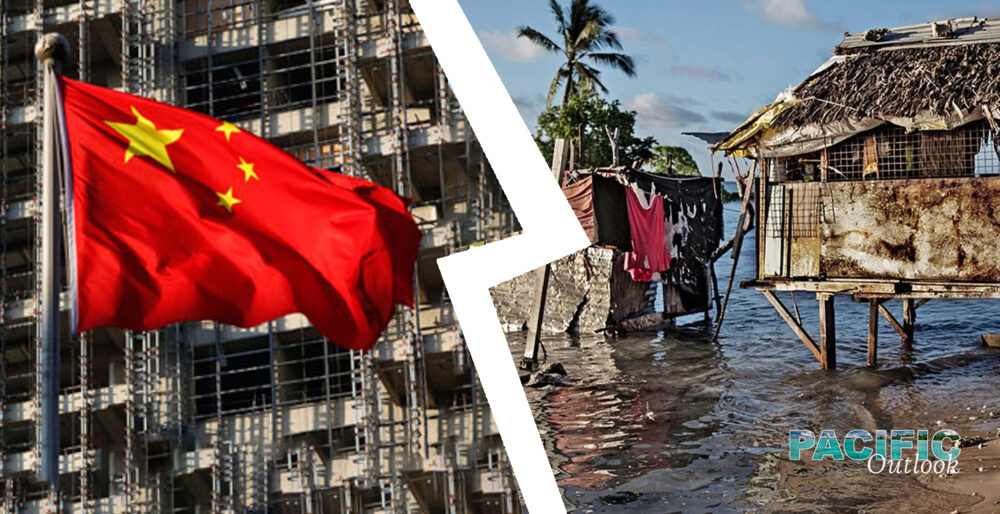MELODIE RUWET |
Pacific island leaders have declared climate change to be their most pressing security threat. Meanwhile, the increased presence of China in the South Pacific region has been the focus of much speculation and commentary. The degree to which this increased presence intersects with the Pacific island leaders’ climate change agenda, however, needs further investigation. Our team, led by Dr Tess Newton Cain from the Pacific Hub, carried out preliminary research into these issues. Our findings are gathered in the “Climate conversations and disconnected discourses” regional outlook launched today.
We had three main research objectives: locating China’s engagement in the Pacific islands’ climate change discourse, exploring Pacific perspectives about China’s engagement with that discourse, and contributing to broader scholarship on climate diplomacy. We designed five research questions to organise and guide our work:
- How does China’s position on climate change engagement and climate diplomacy in the Pacific islands region align with its positions elsewhere (e.g. domestically, on the global stage)?
- How does China engage around climate change within bilateral relationships with Pacific island countries?
- How does China engage around climate change at the regional level in the Pacific (e.g., with Council of Regional Organisations of the Pacific (CROP) agencies, as a Forum dialogue partner)?
- How is China’s engagement in climate change perceived in the Pacific islands region?
- To what extent, if at all, does China’s engagement about climate change influence how it is seen as a diplomatic/development partner in the Pacific islands region?
To assess how China’s diplomatic effort, development activity and economic investment in the Pacific region aligned with Pacific Island nations’ desires for climate action, we looked at regional and bilateral relations. We focused on four target countries to evaluate bilateral relations: Papua New Guinea, Samoa, Solomon Islands, and Vanuatu. To gather data, we organised a series of semi-structured interviews with stakeholders from our target countries, that we complemented with desktop research.
Aside from a review to see how these questions had been addressed (or not) in the literature, the desktop research enabled us to identify and collate official documentation as well as speeches. We also gained an understanding of the projects being funded by China in the Pacific. Most of our 14 interviewees were local experts (policymakers, media and civil society representatives) from the target countries or worked for regional organisations. We also interviewed several experts from the academic community.
Our project was exploratory in nature and our “Regional Outlook” paper should be seen as a conversation starter. We can confirm that this is an area that deserves more attention, and one that it is shifting and evolving rapidly. One of our main findings was how diverse climate change engagement from China in the Pacific is as. The engagement at the regional level varies wildly from bilateral activity, which in turns varies again greatly between countries. These differences can be explained through factors such as the maturity of diplomatic relationships, the nature of initiatives that may be considered, and the attitudes of Pacific officials.
Another important finding is that for climate change to feature in discussions regarding projects or investments between China and the Pacific, it is up to Pacific partners to introduce the topic. However, our participants have expressed that China was responsive to the priorities advanced by Pacific countries. Yet, it seems climate change considerations are seldom introduced by Pacific partners working on development projects with China and/or Chinese contractors. There is therefore a disconnect between how Pacific leaders discuss climate change in regional or global forums and how domestic stakeholders do not prioritise climate change when negotiating for development assistance or investment in their countries.
Regionally, climate change and economic development are discussed hand in hand. We tried to investigate how much the terminology “climate ally” could apply to China from a Pacific perspective and found that this is a possibility for the future of the China-Pacific islands relations. Climate change is a multifaceted issue and according to our interviewees, there are many opportunities for China to contribute to tackling it in the Pacific. Time will tell how these opportunities shape up, and whether China does become a “climate ally” for the Pacific. We look forward to learning more about this issue and where, if at all, there are possibilities for Pacific policymakers to work with all of their development partners to foster collaboration and cooperation in addressing this critical issue.
Melodie Ruwet is a PhD student in the School of Government and International relations at Griffith University. She contributed to the Pacific Outlook publication as part of the Pacific Hub research team.








